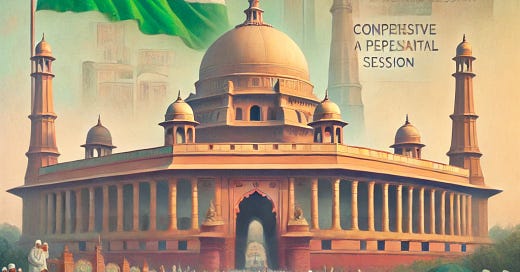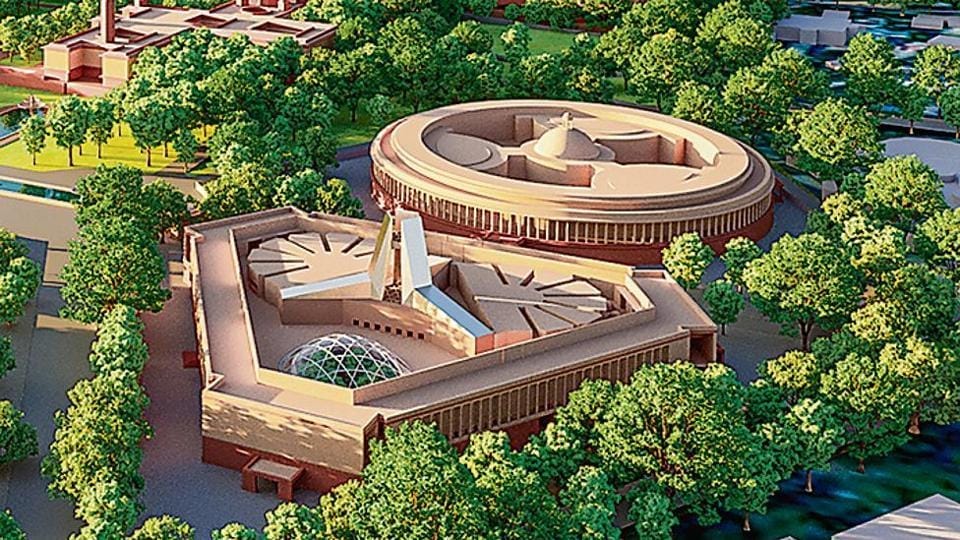Waqf Amendment Bill in Lok Sabha today: Are you aware of its contents and implications?
क्या आप वक़्फ़ क़ानून से वाक़िफ़ हैं? کیا آپ وقف قانون سے واقف ہیں؟
Waqf Amendment Bill in Lok Sabha Today
The Waqf (Amendment) Bill, 2024, is set to be taken up in the Lok Sabha today, marking a pivotal development in the ongoing Budget Session of Parliament. The Bill, which proposes far-reaching amendments to the Waqf Act of 1995, has been at the centre of intense public and parliamentary debate since its initial introduction during the Monsoon Session, followed by its referral to the Joint Parliamentary Committee (JPC) in the last Winter Session. With over 40 proposed amendments, the legislation represents one of the most comprehensive efforts in recent years to overhaul the framework governing Waqf properties—religious endowments that affect millions of Indians, predominantly but not exclusively Muslims, both directly and indirectly. It seeks to address long-standing concerns over mismanagement and opacity in Waqf administration while introducing new mechanisms aimed at transparency, accountability, and equitable governance.
However, the Bill has emerged as one of the most contentious pieces of legislation being steered by the Modi Government. A wide spectrum of the Muslim community perceives it as a direct assault on their fundamental rights as a constitutionally recognised minority. Critics contend that the proposed changes infringe upon the autonomy of Waqf institutions and undermine constitutional safeguards enshrined in Articles 25 to 30. Conversely, pro-government media outlets and influencers have portrayed the Bill as a long-overdue reform of an outdated and anachronistic legal framework—one that, in their view, failed to align with the spirit of the Indian Constitution and rode roughshod over the rights, titles, and interests of non-Muslims, including the State itself. The debate has intensified around the so-called ‘Waqf properties’, with growing scrutiny over historical misclassifications and the alleged encroachment of government and private lands under the guise of Muslim charitable endowments.
Background and Journey of the Waqf (Amendment) Bill
The Waqf (Amendment) Bill, 2024, was first introduced in the Lok Sabha by Union Minority Affairs Minister Kiren Rijiju on 8 August 2024, during the Monsoon Session of Parliament. The Bill proposes sweeping changes to the Waqf Act, 1995, which was last amended in 2013. Among its 40 proposed amendments, the Bill notably seeks to curtail the broad powers of Waqf Boards, particularly their authority to summarily declare properties as Waqf properties—a process that has faced criticism for being arbitrary and draconian.
Following its introduction, the government referred the Bill to a Joint Parliamentary Committee (JPC) for further scrutiny, suggesting a willingness to seek broader consensus. However, the JPC itself has become a source of controversy. Chaired by Jagdambika Pal of the BJP, the committee has held 27 meetings to deliberate on the Bill and was expected to submit its report by 29 November 2024. Opposition members have criticised the committee's handling of the review process, describing it as "bulldozing" and pointing to procedural lapses, inadequate stakeholder consultations, and exclusion of key witnesses.
Stakeholder Concerns and Opposition
The All India Muslim Personal Law Board (AIMPLB) has voiced strong criticism against the proposed amendments, accusing the government of attempting to "usurp" Waqf properties and compromise the autonomy of Waqf institutions. With millions of Indians affected by the governance of Waqf properties, the Bill has ignited sharp reactions from community leaders, activists, and opposition members alike.
Opposition concerns further extend to issues of federalism, legislative competence, and potential infringement of religious freedoms. Some opposition members have argued that including non-Muslim members in the Waqf Council and Board violates the secular principles protected under Articles 25 and 26 of the Indian Constitution. MP K.C. Venugopal criticised the Bill for "attacking the Constitution's secular fabric", while MPs Kanimozhi Karunanidhi and E.T. Mohammed Basheer highlighted potential violations of Article 30, which empowers minorities to manage their institutions.
Key Provisions and Amendments of the Bill
Redefinition of 'Waqf' and Inheritance Protection
Section 3(r) of the Bill redefines "Waqf" as the permanent dedication by any Muslim, practising Islam for at least five years, of any movable or immovable property for purposes recognised by Muslim law as pious, religious, or charitable. Section 3(r)(iv) expands on Waqf-alal-aulad, ensuring that income from such waqf, when the line of succession fails, is used for education, development, and welfare, including the maintenance of widows, divorced women, and orphans as prescribed by the Central Government.
The newly introduced Section 3A establishes specific conditions for the lawful creation of a waqf. It mandates that no person can create a waqf unless they are the lawful owner of the property and possess the competence to transfer or dedicate such property. Importantly, the creation of a waqf-alal-aulad must not result in the denial of inheritance rights to the heirs, including women heirs, of the waqif (the person making the dedication). This provision ensures that the rights of all heirs are protected and that the creation of waqf-alal-aulad does not circumvent inheritance laws.
Introduction of Collector Role and Property Regulation
A significant change comes with Section 3(da), which introduces the position of the Collector, who will assume powers previously vested in the Auqaf Board. The Bill replaces the Survey Commissioner with the Collector for conducting waqf surveys (Section 4) and mandates a 90-day public notice period before updating land records to allow for objections (Section 5). This change aims to make the survey of waqf properties both efficient and effective.
Section 3B requires that every waqf registered under the Act, prior to the commencement of the Waqf (Amendment) Act, 2024, must file detailed information about the waqf and its properties on a designated portal and database within six months. This comprehensive filing requirement aims to prepare a detailed inventory of waqf properties, preventing new and frivolous claims regarding old waqfs and eliminating the possibility of Waqf Boards striking out properties from their registers through collusion or illegal means.
Addressing Government and Evacuee Properties
Section 3C addresses the issue of government properties mistakenly identified or declared as waqf properties. It stipulates that any such government property shall not be considered waqf property. In cases of dispute regarding ownership, the matter is to be referred to the jurisdictional Collector, who will conduct an inquiry and determine whether the property is indeed government property. Until the Collector submits their report, the property in question will not be treated as waqf property.
The Bill also addresses properties in states such as Punjab, Haryana, and Uttar Pradesh that were vested in the Central Government under the Administration of Evacuee Property Act, 1950, and the Displaced Persons (Compensation and Rehabilitation) Act, 1954, but were often misclassified as waqf property. The new provision will allow the Central Government to retrieve these properties and rightfully allot them to displaced persons who have been seeking resolution for 77 years since Partition.
Tribunal Decisions and Dispute Resolution Mechanisms
Under the amended Section 6, disputes over waqf properties are adjudicated by a Tribunal comprising members from the State Judicial Service, State Civil Services, and experts in Muslim law. The amendment extends the period to challenge Tribunal decisions from one to two years and allows late applications for valid reasons. Section 40, which allowed the Waqf Board to collect information on potential waqf properties, is omitted to prevent abuse by lower functionaries of the Waqf Board who ran "virtual extortion rackets" concerning disputed properties.
Inclusive Composition and Improved Audit Process
The composition of the Central Waqf Council (Section 9) and Board of Auqaf (Section 14) now includes mandatory representation of women and non-Muslims, aiming for more inclusivity and diversity. Section 36 now requires a waqf deed for registration and mandates the Collector to verify the application's genuineness, with disputed properties not being registered without court resolution.
Section 47 revises the audit process, stipulating that auditors must be from a state-prepared panel. The Central Government can also direct audits by the Comptroller and Auditor General of India and publish audit reports, enhancing transparency and accountability.
Government's Defence and Legislative Intent
Minority Affairs Minister Kiren Rijiju defended the Bill during the Monsoon Session, citing its alignment with the Sachar Committee’s recommendations. He asserted that the Bill does not infringe on religious freedoms and falls within the legislative competence under the Concurrent List’s Entries 10 and 28. Rijiju referenced the 1976 Waqf Inquiry Report, highlighting issues with current waqf property management, including the concentration of benefits among mutawallis. He justified the amendments as necessary for transparency and efficient dispute resolution, noting the high number of pending cases before Waqf Tribunals.
The Bill, according to its Statement of Objects and Reasons, aims to address inefficiencies in the administration of auqaf, as identified by the Sachar Committee and other reports. It seeks to enhance transparency, accountability, and the equitable distribution of waqf benefits.
The JPC Report: Concerns and Procedural Questions
The Joint Parliamentary Committee (JPC) has faced criticism for rushing to meet its 29 November 2024 deadline. Opposition members have alleged that the committee’s recent tour of Karnataka lacked quorum, further questioning the legitimacy of its findings. They have also raised concerns about the inclusion of testimonies from individuals with no direct connection to Waqf issues, which they argue dilutes the credibility of the deliberative process.
Opposition MPs have formally appealed to Lok Sabha Speaker Om Birla for an extension of the committee’s tenure, insisting on the need for a more thorough review. It is worth noting that the JPC’s recommendations, whether with or without dissenting notes, are not binding on the government or Parliament. The Central Government retains full liberty to accept, reject, or amend the report in whole or in part and may even introduce official amendments beyond the JPC’s suggestions.
Summing Up and Looking Forward: Balancing Reform and Inclusivity
The Waqf (Amendment) Bill, 2024, represents a significant attempt to reform the functioning of both Central and State Waqf Boards. While the need for reform is widely acknowledged—particularly to address issues of corruption, mismanagement, and the influence of land mafias—the implementation must be balanced and inclusive. It is essential to view this Bill not as an anti-Muslim measure but as an opportunity to create a more equitable system that benefits poor and needy Muslim citizens through waqfs, which are fundamentally charitable institutions.
As the Bill comes before the Lok Sabha today, it is crucial that reforms promoting equity and justice, including benefits for the broader Muslim community, are not politicised on narrow parochial, electoral, or communal grounds. The essence of parliamentary scrutiny lies in ensuring that the final legislation reflects a judicious balance of diverse views and interests. By focusing on the substantive merits of the proposed amendments rather than political positioning, lawmakers can ensure that waqf reforms serve their intended purpose: enhancing transparency, accountability, and the equitable distribution of benefits to those who need them most. Careful deliberation, rather than political expediency, will lay the foundation for robust and sustainable waqf governance that serves both the letter and spirit of these charitable endowments.
Modern Muslim Philanthropy in India: Moving Beyond Traditional Waqf Structures
Modern Muslim Philanthropy: Embracing Flexible and Inclusive Structures
The Waqf Act, 1995 Deserves a Decent Burial—in the Current Session of the Parliament
1. Introduction: The Genesis of the Debate via Private Member's Bill








